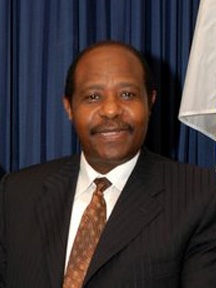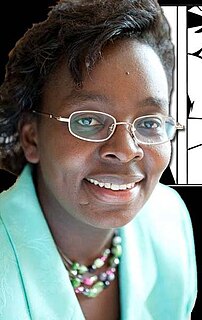Related Research Articles

The Interahamwe is a Hutu paramilitary organization active in the Democratic Republic of the Congo and Uganda. The Interahamwe was formed around 1990 as the youth wing of the National Republican Movement for Democracy and Development, the then-ruling party of Rwanda, and enjoyed the backing of the Hutu Power government. The Interahamwe, led by Robert Kajuga, were the main perpetrators of the Rwandan genocide, during which an estimated 500,000 to 1,000,000 Tutsi, Twa, and moderate Hutus were killed from April to July 1994, and the term "Interahamwe" was widened to mean any civilian bands killing Tutsi.

The Rwandan genocide occurred between 7 April and 15 July 1994 during the Rwandan Civil War. During this period of around 100 days, members of the Tutsi minority ethnic group, as well as some moderate Hutu and Twa, were killed by armed Hutu militias. The most widely accepted scholarly estimates are around 500,000 to 662,000 Tutsi deaths.

This is a bibliography for primary sources, books and articles on the personal and general accounts, and the accountabilities, of the 1994 Rwandan genocide.

Paul Rusesabagina is a Rwandan politician. He worked as the manager of the Hôtel des Mille Collines in Kigali, during a period in which it housed 1,268 Hutu and Tutsi refugees fleeing the Interahamwe militia during the Rwandan genocide. None of these refugees were hurt or killed during the attacks.
The Gacaca courts were a system of community justice in Rwanda following the 1994 genocide. The term 'gacaca' can be translated as 'short grass' referring to the public space where neighborhood male elders (abagabo) used to meet to solve local problems. The name of this system was then adopted in 2001 as the title of the state's new criminal justice system "Gacaca Courts" to try those deemed responsible for the 1994 Rwandan genocide where over an estimated 500,000 people were killed, tortured and raped. In 1994, the United Nations Security Council created the International Criminal Tribunal for Rwanda to try high-ranking government and army officials accused of genocide, war crimes, and crimes against humanity. The Gacaca Courts were established in law in 2001, began to operate on a trial basis in 2002 and eventually came to operate as trials throughout the country by early 2007.

Sometimes in April is a 2005 American made-for-television historical drama film about the 1994 Rwandan Genocide, written and directed by the Haitian filmmaker Raoul Peck. The ensemble cast includes Idris Elba, Oris Erhuero, Carole Karemera, and Debra Winger.

Shake Hands with the Devil is a 2007 Canadian war drama film starring Roy Dupuis as Roméo Dallaire, which premiered at the Toronto International Film Festival in August 2007. Based on Dallaire's autobiographical book Shake Hands with the Devil: The Failure of Humanity in Rwanda, the film recounts Dallaire's harrowing personal journey during the 1994 Rwandan genocide and how the United Nations failed to heed Dallaire's urgent pleas for further assistance to halt the massacre.

Maraba coffee is grown in the Maraba area of southern Rwanda. Maraba's coffee plants are the Bourbon variety of the Coffea arabica species and are grown on fertile volcanic soils on high-altitude hills. The fruit is handpicked, mostly during the rainy season between March and May, and brought to a washing station in Maraba, where the coffee beans are extracted and dried. At several stages, the beans are sorted according to quality. The farmers receive credits based on the amount and quality of the beans they provide.

The Kigali Genocide Memorial commemorates the 1994 Rwandan genocide. The remains of over 250,000 people are interred there.
Survivors Fund, founded in 1997, represents and supports survivors of the Rwandan genocide in the United Kingdom and Rwanda. It is the only international charity with a specific remit to assist survivors of the Rwandan genocide, and has offices in London and Kigali. It is registered with the Charity Commission.

Victoire Ingabire Umuhoza is a Rwandan politician and chairperson of a new political party - Development And Liberty For All (DALFA-Umurinzi) with the focus to campaign for more political space and for development. Previously, she was the president of the Unified Democratic Forces (UDF), a coalition of Rwandan exile opposition groups with a large base of active members in Rwanda, Europe, United States of America and in Canada. She was UDF party candidate for Rwanda's August 2010 presidential elections, but was ultimately arrested and sentenced to prison. A Sakharov Prize nominee, she served 8 years of a 15-year prison sentence in Kigali Central Prison on charges of terrorism and threatening national security.

Antoine Kambanda is a Rwandan prelate of the Catholic Church who has been Archbishop of Kigali since January 2019. He had been Bishop of Kibungo from 2013 to 2018.
Violence during the Rwandan genocide of 1994 took a gender-specific form when, over the course of 100 days, up to half a million women and children were raped, sexually mutilated, or murdered. The International Criminal Tribunal for Rwanda (ICTR) handed down the first conviction for the use of rape as a weapon of war during the civil conflict, and, because the intent of the mass violence against Rwandan women and children was to destroy, in whole or in part, a particular ethnic group, it was the first time that mass rape during wartime was found to be an act of genocidal rape.
Duhozanye: A Rwandan Village of Widows is a feature Norwegian documentary film for television from 2011 by director Karoline Frogner.
Kizito Mihigo was a Rwandan gospel singer, songwriter, organist, composer of sacred music, television presenter, genocide survivor, peace maker and peace and reconciliation activist. Kizito was an iconic activist who dedicated his life to healing the souls of his fellow genocide survivors and rebuilding unity and reconciliation in Rwanda. According to Kisito's words, published on Kizitomihigo.com, he claimed, "The objective of my works is to console and strengthen the wounded hearts, singing peace and forgiveness." His ultimate performance in healing and Peacebuilding started in 2010 when he created the Kizito Mihigo Peace Foundation, a non-profit organization devoted to his cause.
The Kizito Mihigo Peace Foundation, also called KMP Foundation, is a Rwandan non-governmental organization created in 2010 by the Rwandan gospel musician Kizito Mihigo. The foundation's main objective is to promote peace and reconciliation after the 1994 genocide.

Dorothée Munyaneza is a British-Rwandan singer, actress, dancer and choreographer. She has produced two performance pieces, Samedi Détente and Unwanted, both about the Rwandan genocide.
Capital punishment is no longer a legal punishment in Rwanda. The death penalty was abolished in Rwanda in 2007.
Chantal Kabasinga is a Rwandan politician and the President of the Association of Widows of Genocide in Rwanda.
References
- ↑ http://www.thefreelibrary.com/A+hollow+slogan%3F+'Never+again'+is+not+enough.-a0151047847 [ dead link ]
- ↑ Dembour, Marie-Bénédicte; Kelly, Tobias (18 October 2007). Paths to International Justice: Social and Legal Perspectives. ISBN 9780521882637.
- ↑ Mbabazi, Donah (6 April 2017). "It Is Still Work in Progress for Genocide Widows – Mukabayire". The New Times . Kigali, Rwanda. Archived from the original on 20 February 2022. Retrieved 20 February 2022.
- ↑ Umutesi, Doreen (11 April 2012). "Q&A: Kabasinga: A Survivor Who Now Is Thriving". The New Times . Kigali, Rwanda. Archived from the original on 20 February 2022. Retrieved 20 February 2022.
- ↑ "Visit to the ICTR of Representantatives of Rwandan Survivors". justiceinfo.net. Lausanne, Switzerland: Fondation Hirondelle. 25 June 2007. Archived from the original on 20 February 2022. Retrieved 20 February 2022.
- ↑ "Droits-Rwanda: Les rescapés du génocide seront-ils indemnisés?" [Rights-Rwanda: Will Genocide Survivors Be Compensated?] (in French). Rome, Italy. Inter Press Service. 12 April 2006. Archived from the original on 20 February 2022. Retrieved 20 February 2022.
- ↑ Colson, Marie-Laure (6 May 1996). "Rwanda: des veuves, laissées pour compte. Deux ans après le génocide, leur survie, comme celle des orphelins reste très difficile" [Rwanda: Widows Left behind Two Years after the Genocide, Their Survival, Like That of Orphans, Remains Very Difficult]. Libération (in French). Paris, France. Archived from the original on 20 February 2022. Retrieved 20 February 2022.